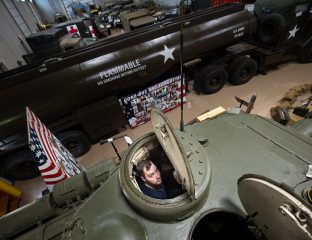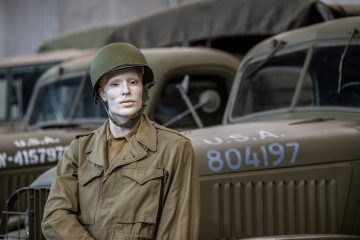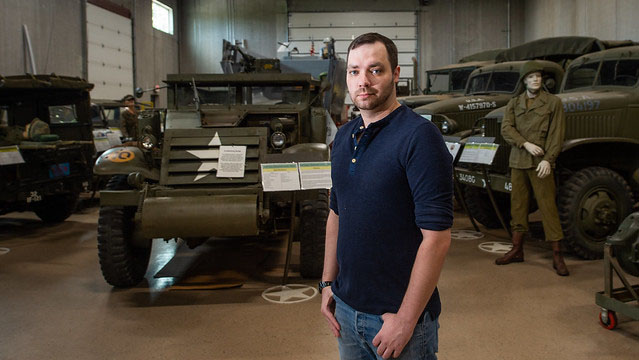An internship at a military museum was a great experience for a University of Wisconsin Oshkosh student—so much so that Zachary Caldwell has continued to volunteer his time after classes ended in spring.
Caldwell, a member of the U.S. Air Force Reserve following seven years of active duty with the Air Force, is a senior history major who aspires to a career in museums.
When UW Oshkosh associate history professor Gabriel Loiacono was considering an internship opportunity for Caldwell, an Oshkosh resident, a position at the Military Veterans Museum and Education Center at 4300 Poberezny Drive, seemed a perfect opportunity.
“The ability to talk and be around history is what I wanted to do,” Caldwell said. “Explaining it to people is just so rewarding.”

Caldwell said he loved airplanes as a child, but his eyesight was too poor for him to pilot planes. The U.S. Air Force was a good choice for him and he served as a mechanic.
Caldwell lived in Germany for several years, and would spend free time traveling around the countryside—bringing his young coworkers with him on his treks.
At the Military Veterans Museum and Education Center, Caldwell sees a lot of older veterans come through the doors.
“It’s a trip down memory lane for them,” he said, adding that he sees a lot of people who served during Vietnam and Korea and a few from World War II.
Donated military artifacts are displayed to educate citizens on American military history. The John E. Kuenzl Motor Pool houses the largest military vehicle museum in Wisconsin. Artifacts include weapons, uniforms, vehicles, gear, medals and many other items.
Five World War II veterans from Neenah started the museum.
Caldwell finds the WWI period to be the most interesting. He said he thinks it’s a conflict that most Americans forget about because the U.S. role was less pronounced than it was in WWII.
“It’s a shame, because so much of the modern world is shaped by that conflict—from major things like the borders of nations in the Middle East, which have been laden with conflict, to simple everyday things like the popularity of wristwatches (pocket watches on chains were impractical in trench warfare) and disposable tissues (initially considered for gas mask filters).”
Caldwell’s main role at the museum has been accessions— he processes donation paperwork into a database, ensuring donated artifacts are properly documented and thank-you letters generated. His work helps keep the array of donated items organized and rotated. There are two storage facilities offsite containing different styles of uniforms and helmets and numerous other items related to military service.
Caldwell personally collects items when he can, including a medal from the Battle of Verdun, some WWI-era firearms and a Lithuanian traditional drinking glass. The high cost of many items, though, has kept him from owning as much as he would like.
 Reflecting on the past
Reflecting on the past
“Many people, myself included, love history for the great stories,” Loiacono said. “I think the most important reason to study the past, though, is because it is a big part of what makes us the way we are today, both as societies and as individuals. We can’t really know who we are (and why we are that way) without studying the past. For students, moreover, studying history also hones analytical skills, the ability to read and make sense of different texts coming from different minds and contexts, as well as writing skills.”
Loiacono serves as internship coordinator for the history department. Part of his job is to talk with students and together figure out what the best fit would be for their internship.
“Zach’s background, working with military vehicles while in the Air Force, and his interests, made the Military Veterans Museum a really good fit,” Loiacono said.
Students who major in history are qualified for many different careers—most of which are not about history, he added, but use history majors’ skills as analysts, writers and critical readers.
Loiacono said many history majors do not know where to begin their career search and need to try things out to see what might be the best avenue.
“For history majors thinking about a career as an historian, the history department internships give them a taste of some kind of historical work while earning upper-division credit in the department,” he said. “They can’t really know what museum work is like, for example, without trying it out. This is one way to do that.”
Caldwell said after he graduates from UW Oshkosh—he believes he will complete undergraduate studies in December 2020—he plans to continue his education in Madison or Milwaukee, seeking a degree in museum or library science.
Learn more:
- Full photo gallery of Caldwell at the museum
- Study history at UW Oshkosh
- UWO students achieve career success through internships
- Military Veterans Museum and Education Center

